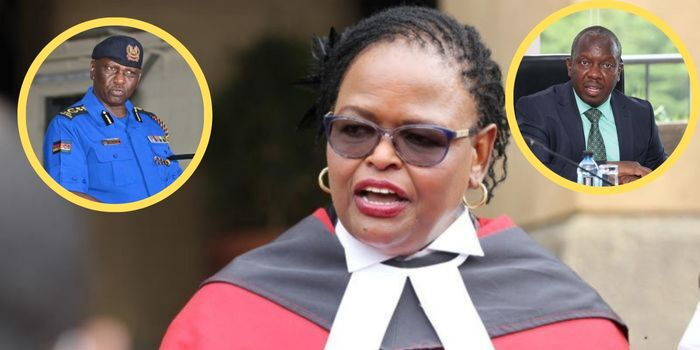Chief Justice Martha Koome has issued a clear and firm message to Inspector General of Police Douglas Kanja and Director of Public Prosecutions (DPP) Renson Ingonga, urging them to strictly follow the law when dealing with terrorism-related charges.
Speaking on Friday, July 25, CJ Koome stressed the importance of upholding legal standards, especially when applying terrorism laws.
She emphasized the need for ongoing training, skills improvement, and better understanding of how to respond to the growing threat of terrorism and its impact on both national and global peace and security.
According to Koome, Kenya’s 2010 Constitution provides a strong and clear legal framework for the police, the DPP (who is the country’s chief prosecutor), and the Judiciary when handling terrorism cases.
“The law has clearly defined what qualifies as an act of terrorism,” CJ Koome said.
She further clarified that it is the police’s duty to carry out thorough and lawful investigations, while the DPP is responsible for independently examining both the legal and evidential aspects of a case to ensure that terrorism charges presented in court are legally sound.
“It is not enough to make arrests—the evidence must meet the legal threshold for terrorism. The DPP must make objective, independent decisions based strictly on the law,” she added.
Controversy Over Terrorism Charges on Protesters
CJ Koome’s comments came in the middle of a growing public debate over the way terrorism charges have recently been used in Kenya—particularly against individuals arrested during the June 25 and Saba Saba protests.
Many human rights groups and political observers have voiced concern that the DPP’s office might be misusing anti-terrorism laws to silence protesters and suppress public dissent.
Some activists have accused the DPP of falsely charging peaceful demonstrators with terrorism-related offenses—an accusation that has triggered public outcry and questions about the DPP’s independence.
There were also fears among Kenyans that the Office of the Director of Public Prosecutions (ODPP) may be acting under pressure from the Executive branch of government—a claim that has been strongly denied by DPP Ingonga.
DPP Ingonga Denies Government Influence
On Thursday, July 24, DPP Renson Ingonga responded to the backlash, defending his office’s integrity. He maintained that the ODPP makes its decisions based only on credible evidence, not political influence.
“We are not being influenced by anyone. Every prosecution we pursue is based on solid facts and investigations,” Ingonga said.
He firmly rejected the narrative that his office is being used to carry out the government’s political agenda, especially in relation to silencing youth-led protests and public criticism.
CJ Koome Clarifies Judiciary’s Position
The issue also touched on Chief Justice Koome herself after DPP Ingonga cited her previous remarks regarding the torching of the Kikuyu Law Courts as justification for laying terrorism charges against those arrested during the incident.
In response, the Judiciary issued a formal statement to distance CJ Koome from influencing terrorism charges. The clarification came after critics accused the Chief Justice of indirectly giving the DPP grounds to pursue excessive charges.
The DPP had interpreted Koome’s comments on the arson attack as labeling it a terrorist act, which he then used to support his legal actions. However, the Judiciary emphasized that Koome’s statements were not meant to direct legal action, and that the courts must remain neutral and independent in matters of criminal justice.
What Kenya’s Terrorism Law Says
The Prevention of Terrorism Act (POTA), 2012, outlines what qualifies as a terrorist act in Kenya. According to the law, a terrorist act is any action—or threat of action—that involves certain forbidden activities and is carried out with terrorist intent.
Examples of prohibited actions include:
- Causing violence or harm to a person
- Putting lives at risk
- Serious damage to buildings or property
- Use of guns, bombs, or explosives
- Threatening public safety or national security
- Creating widespread fear or panic in the population
The terrorist intent can involve trying to:
- Scare or intimidate the public or a particular group
- Force the government or international bodies to act a certain way
- Destabilize the country’s political, religious, or social systems
These definitions show that terrorism charges must meet strict conditions, and should not be used lightly—especially not as a tool to crack down on peaceful protests or political dissent.
Final Thoughts
CJ Koome’s remarks serve as a powerful reminder to both the police and the DPP that Kenya’s laws must be applied with fairness, accuracy, and integrity.
Her call for professionalism, independence, and strict adherence to legal standards highlights the Judiciary’s commitment to justice—even in politically sensitive matters such as terrorism cases.
The ongoing conversation around terrorism charges in Kenya is not just about the law—it’s also about protecting civil rights, ensuring public accountability, and maintaining public trust in the country’s legal institutions.
Join Gen Z New WhatsApp Channel To Stay Updated On time https://whatsapp.com/channel/0029VaWT5gSGufImU8R0DO30


